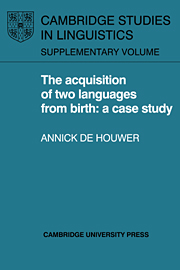Book contents
- Frontmatter
- Contents
- List of tables
- Symbols and abbreviations
- Acknowledgements
- 1 Introduction
- 2 Bilingual first language acquisition: methods and theories
- 3 A new study of bilingual first language acquisition: aims and hypotheses
- 4 Case study of a bilingual child: introduction
- 5 Language choice and Mixed utterances
- 6 The noun phrase
- 7 The verb phrase
- 8 Syntactic analysis
- 9 The morphological and syntactic analyses: a recapitulation
- 10 Metalinguistic behaviour
- 11 Findings and implications
- References
- Appendix
- Index of names
8 - Syntactic analysis
Published online by Cambridge University Press: 17 August 2009
- Frontmatter
- Contents
- List of tables
- Symbols and abbreviations
- Acknowledgements
- 1 Introduction
- 2 Bilingual first language acquisition: methods and theories
- 3 A new study of bilingual first language acquisition: aims and hypotheses
- 4 Case study of a bilingual child: introduction
- 5 Language choice and Mixed utterances
- 6 The noun phrase
- 7 The verb phrase
- 8 Syntactic analysis
- 9 The morphological and syntactic analyses: a recapitulation
- 10 Metalinguistic behaviour
- 11 Findings and implications
- References
- Appendix
- Index of names
Summary
Preliminaries
Introductory remarks
In the preceding section on morphology, it was established that Kate's use of bound morphemes and closed-class items such as articles, demonstratives and third person singular pronouns is largely language-specific. Apart from a few ambiguous errors which can be explained either developmentally from within the same language system or as being the result of knowledge of the other language, most errors (both over- and underextensions) can be interpreted by referring to elements existing within each language system separately. Correct usage can be traced back to each input system separately as well. For most of the aspects analysed, the data from Kate resemble those from monolingual children learning English or Dutch as their only language.
The present chapter will try to address the question whether this picture of separate development as found for morphology also holds in the area of syntax, which deals with “the way in which words are combined to form sentences” (Quirk, Greenbaum, Leech and Svartvik 1985: 43).
A first major section deals with word order. Secondly, we shall try to trace Kate's general syntactic development. In all parts of the analysis, only utterances that were fully transcribed are taken into account. In addition, only utterances with more than one constituent are analysed here. As in the chapters on morphology, comparisons will be drawn with reports on the language productions of monolingual children wherever possible.
- Type
- Chapter
- Information
- The Acquisition of Two Languages from BirthA Case Study, pp. 237 - 305Publisher: Cambridge University PressPrint publication year: 1990



